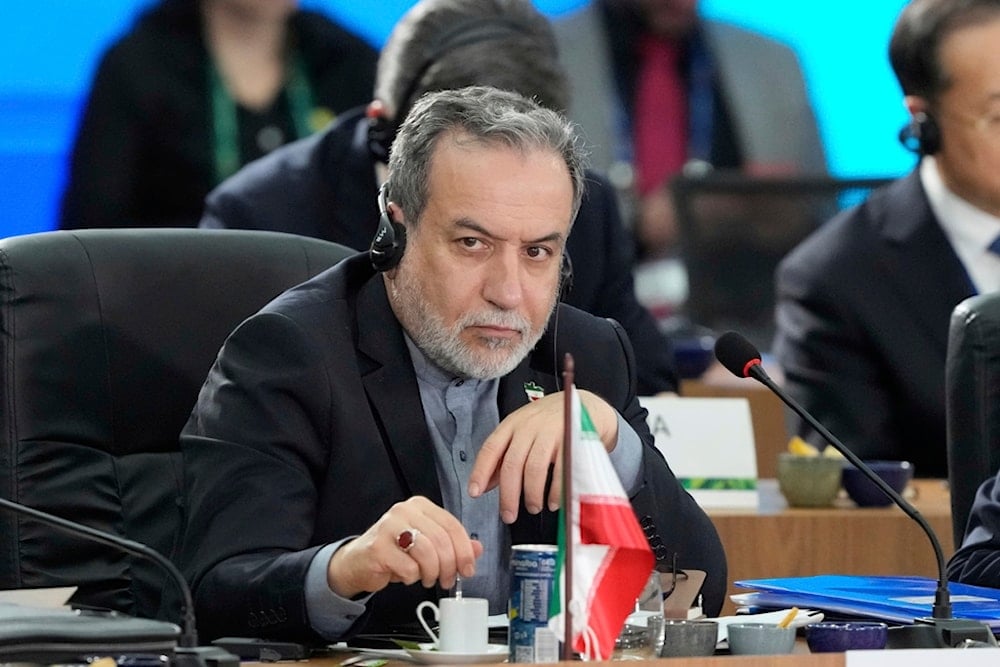Iran criticizes Europe’s snapback move as 'politically destructive'
Iran’s FM Abbas Araghchi warns Europe against triggering snapback sanctions, asserting that Tehran would not compromise on its nuclear rights or security.
-

Iranian Foreign Minister Abbas Araghchi attends the 17th annual BRICS summit in Rio de Janeiro, Sunday, July 6, 2025. (AP)
Iranian Foreign Minister Abbas Araghchi has reiterated that Tehran remains committed to securing its legitimate rights under the Treaty on the Non-Proliferation of Nuclear Weapons (NPT), stressing its peaceful use of nuclear energy while remaining open to constructive dialogue.
In an article published in Indonesia’s The Jakarta Post titled “In Condemnation of Europe’s Snapback Move”, Araghchi highlighted that Iran’s latest agreement with the International Atomic Energy Agency (IAEA) reflects its continued diplomatic efforts to resolve outstanding issues regarding its peaceful nuclear activities.
He noted that the agreement with the agency would remain in effect unless hostile actions are taken against Iran, including attempts to reimpose previously lifted UN Security Council resolutions. Should such measures occur, Iran would consider the arrangement null and void.
“Iran will never compromise on its sovereign rights and security,” Araghchi emphasized.
European move'politically destructive'
Araghchi sharply criticized the E3, the United Kingdom, France, and Germany, for pursuing the activation of the snapback mechanism to restore UN sanctions, warning that it would inflict “irreparable damage” on Europe’s international standing.
He described the move as lacking legal basis or legitimacy, calling it “politically destructive". The foreign minister argued that it was the United States, not Iran, that violated UN Security Council Resolution 2231 through its unilateral withdrawal from the 2015 Joint Comprehensive Plan of Action (JCPOA).
Araghchi said Europe failed to honor its commitments and instead aligned itself with Washington’s “illegal sanctions", a stance he warned would ultimately exclude the three states from future diplomatic tracks.
“If this short window to change course is lost, destructive repercussions will engulf West Asia and the international system,” he added, warning of risks to global security and the credibility of international agreements.
Israeli violations in West Asia
Turning to regional issues, Araghchi condemned what he described as repeated violations of international law by the Israeli occupation, accusing it of undermining global norms and widening the scope of its crimes in West Asia.
He said recent Israeli attacks on five Arab countries, namely Palestine, Lebanon, Syria, Qatar, and Yemen, exposed once again the “brutal and aggressive nature” of the regime, linking it to what he called the long-standing project of “Greater Israel".
“The dream publicly promoted by Benjamin Netanyahu under the project of ‘Greater Israel’ has put the sovereignty of other Islamic states in West Asia under grave threat,” he wrote.
Araghchi reiterated that Iran has consistently demonstrated its commitment to diplomacy in addressing nuclear issues and will continue seeking a fair and balanced agreement.
Iran says West to break promises
Iran’s Supreme National Security Council Secretary Ali Larijani said on Iranian television that Western states had previously assured Tehran they would not activate the snapback mechanism if an agreement was reached with the International Atomic Energy Agency (IAEA) to reset relations.
"We did reach such an agreement with the Agency, but the European troika later changed its stance," Larijani said.
He explained that Russia proposed extending the deadline for the trigger mechanism by six months while talks continued, a proposal Tehran accepted. "However, this too did not materialize due to European rejection," he added.
According to Larijani, the European countries also suggested broader negotiations that would include dialogue with the United States. "We agreed in order to remove any pretexts, yet they went on to create new ones," he stated.
Larijani stressed that Washington is insisting on addressing Iran’s missile program in any new negotiations, a demand Tehran has "firmly rejected".

 4 Min Read
4 Min Read








